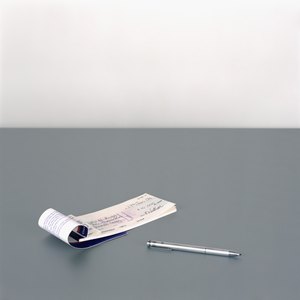
One of the safest ways to travel the world, still, is by using traveler's checks. These financial instruments can be cashed at nearly any bank in the world, and major retailers around the world often accept them -- and return them for cash. In addition, these checks are safe and secure; they come with copies that make it easy to replace them if lost or stolen, and usually the distributor -- in general, either Visa or American Express -- offers round-the-clock customer service. Best of all, these checks never expire.
No Expiration
Traveler's checks never expire. This means that you can use them on a trip abroad, save any remaining checks -- in a safe location, such as a safety deposit box -- and then bring them on any subsequent trips. In addition, if your checks are old and damaged, you can either cash them in for the face value or call the issuer to replace it. Make sure to always keep the check copies for verification.
Eliminating Checks
If you recently returned from a trip and do not expect to take another one for a while, you may want to consider cashing them in and putting the money in an interest-bearing account. While the checks never expire, they also do not help you financially. Traveler's checks will not earn interest or mature past their face value, unlike safety deposit bonds. If you exchange these checks for cash, you have the opportunity to deposit the money into an account that could earn interest.
Death
Traveler's checks don't expire even when the holder of such checks dies. According to the New York Comptroller's Office, traveler's checks become part of the deceased's estate as unclaimed funds. Therefore, it is up to the surviving members of the family -- and those mentioned in the will -- to sort out the unclaimed funds in probate court.
Other Options
One option, particularly attractive if you are a frequent traveler, is to hold onto your checks. Obtaining new traveler's checks incurs new fees and is a hassle, so keeping old checks might be best for the frequent flier. Another option is to donate the old traveler's checks to a charity. The original check holder must sign each traveler's check before it can be cashed by the charity.
References
Writer Bio
Based in Eugene, Ore., Duncan Jenkins has been writing finance-related articles since 2008. His specialties include personal finance advice, mortgage/equity loans and credit management. Jenkins obtained his bachelor's degree in English from Clark University.

